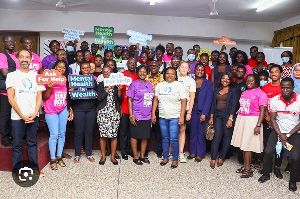Professor Richard Adanu, Dean of the School of Public Health of the University of Ghana, has said the application of Information Communication Technology (ICT) to the healthcare industry would help address universal healthcare challenges.
Speaking on the theme of the 67th Annual New Year School: “Promoting Universal Health for a sustainable development in Ghana: Is ICT the Game Changer”, he said ICT could facilitate universal healthcare in Ghana if it targeted the decision makers in families and households.
Prof Adanu, who gave the keynote address at the opening of the 67th New Year School, said it would be better if the application of ICT was targeted at people in households who actually made the decisions on whether or not a particular ailment required medical attention.
He said Ghana’s healthcare system faced challenges as it still relied heavily on paper based medical records, it was centred around health workers and it has weak data capture and storage systems.
He said given the improvements in technological advancements such as proliferation of mobile phones and smartphones, increased internet coverage and the growing use of laptops and tablets by young people, ICT could address those challenges.
Prof. Adanu said there is a need for effective knowledge sharing in order to achieve universal health coverage adding that this could be done via voice and text SMS, interactive training materials, cell phone linkages between frontline medical people especially in rural areas and specialists in the cities.
Such platforms could be used for appointments scheduling to avoid queues at the hospitals, call centers, referral systems and smart interactive web pages to give advice and medical information to patients, he added.
Mr Alex Segbefia, Minister of Health, who opened the five-day school and conference, said effective use of ICT products in healthcare could help to make diagnosis easier and more accurate, thus saving large amounts of money that went into treatments such as in the case of malaria.
He said in order for Ghana and Africa to achieve the Sustainable Development Goals, it would have to employ ICT since there had been phenomenal advancements in technology in general and health technology in particular over the last decades.
The Minister said for universal healthcare coverage to be achieved and sustained there was the need to develop and sustain community health services since that was the core basic level.
Mrs Lucy Quist, Managing Director of Airtel Ghana, who sponsored the programme, drew the school’s attention to possible uses of ICT that could impact lives using real life examples and called on participants to articulate ideas that would to harness the transformational power of ICT in healthcare.
Health News of Wednesday, 13 January 2016
Source: GNA
‘ICT is the game-changer in universal healthcare’
Entertainment















